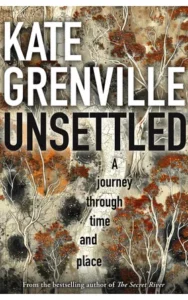 I could start where I was: myself and those family stories. I had the image of a tight little frame, and my family stories neatly enclosed within it, telling their narrow bit of truth, and then the frame expanding out and out and out. As the frame expanded it would take in the people who were here when my forbears came into their land. Not to tell their story. Not to ask them to tell it. And not to catalogue the horrors. Just to travel to the places where the family stories happened, and put the stories and those First People back into the same frame, on the same country, and see what unfolded.
I could start where I was: myself and those family stories. I had the image of a tight little frame, and my family stories neatly enclosed within it, telling their narrow bit of truth, and then the frame expanding out and out and out. As the frame expanded it would take in the people who were here when my forbears came into their land. Not to tell their story. Not to ask them to tell it. And not to catalogue the horrors. Just to travel to the places where the family stories happened, and put the stories and those First People back into the same frame, on the same country, and see what unfolded.
There are many things I loved about Unsettled, starting with its clever title. There are beautiful and lyrical descriptions that show me a land I recognise and love, and precise and orderly accounts of how that land was stolen. Not just by force, but also via bogus legalities.
Then there’s the perfect structure; a journey – a pilgrimage – which took Grenville down the family tree, from her great-great-great-grandfather to her mother, back through the generations from Wiseman’s Ferry on the Hawkesbury to Tamworth. She traveled through the NSW landscape, trying to locate farms and pastoral properties and houses, taking the roads her forbears did. And taking that wider view, widening the frame to the First Nations people who were there first. All the time knowing and feeling that her family were:
…part of a relentless flood of foreigners who eventually pushed into every corner of the continent. Over many years they did their best to push out the people who were there. Took their country, their livelihood, their children and often their lives.
I’m a non-Indigenous, 6th generation Australian; I’ve just started researching my family history. After reading Unsettled, I want to do better. I want to start putting Aboriginal people in the same frame as my great-great-grandparents who worked on Western District pastoral properties before the goldrush. I want to think differently about the words that I use in thinking and writing about my people.
The book made me pay real attention to the almost benign language that was used in the past – certainly in my schooldays – to describe colonisation. Take the word settled. It’s a nice word. Even cosy. But, if some people settled, then other people were unsettled. Kate Grenville italicises words to nudge the reader into thinking about alternative meanings for words we have used to talk about the history of Australia. Heritage. Squatter and pastoralist. Crown land. Explore. Open up. Taking up land means taking land from the people who already lived there.
My generation were told stories of pioneers; heroic men on horseback, with bullock drays and flocks of sheep. When we ‘did’ Australian history in grades 4 and 5, nine-and ten-year-old self didn’t find the stories heroic; they were scarcely even interesting. I feel quite differently after reading Unsettled. Who knows? I might be inspired to drive to Lake Bolac, to try to find the place where my great-great grandfather lived as a boy. It was a remote place, a sheep run. The family story is that the men defended themselves against an attack by the local Aboriginal people. I suspect if I interrogate the story, I’ll find it was a massacre.
I’ve been circling this book for years, but the subject seemed to difficult. It’s about the
questions that come from being a non-Indigenous person in Australia. What do we do with the fact that we’re the beneficiaries of a violent past? If we acknowledge that we’re on land that was taken from other people, what do we do about that?
Unsettled is a quietly devastating, thoughtful and and necessary book.

I thought this was brilliant — quietly devastating and confronting without ever being aggressive. I hope lots of people read it.